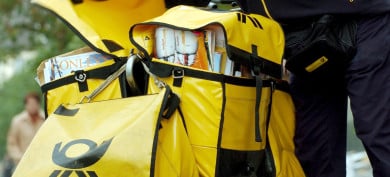The fall in net profit to €407 million ($629 million) – analysts polled by Thomson Financial News had forecast €455 million – was also due to the period having two fewer working days, a statement said.
Operating income for the first three months fell 14.7 percent to €851 million, while revenues grew 1.8 percent to €15.7 billion. The weak dollar and pound helped shave more than four percentage points off revenue growth.
As reported on May 8, turbulence in financial markets stemming from the collapse of the US subprime mortgage market led to operating profit falling by more than a fifth at Postbank in the first three months of the year.
Deutsche Post said it was sticking to its target of operating income before one-off items of around €4.2 billion for the whole of 2008, and of €4.7 billion for 2009.
The company announced it would set a turnaround plan within the next two weeks for its troubled US division, which saw further problems in the first quarter.
Post chief executive officer Frank Appel said in early March that a retreat from the US unit was not an option.
afp/dpa/ddp



 Please whitelist us to continue reading.
Please whitelist us to continue reading.